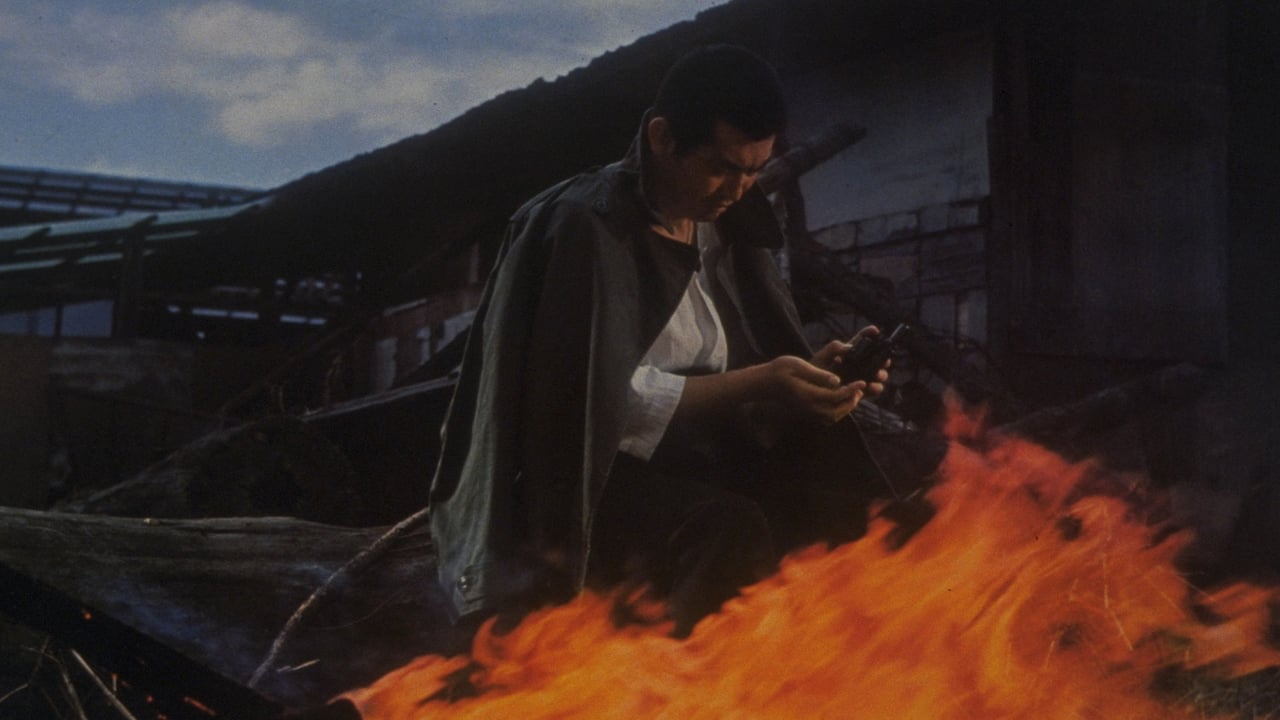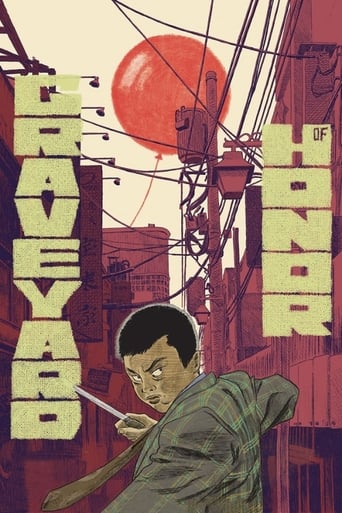

Unhinged and unpredictable renegade yakuza gang member Rikio Ishikawa (an excellent and intimidating portrayal by Tetsuya Watari) gets banished to Osaka because of his crazy and violent conduct. Only young courtesan Chieko (a fine and sympathetic performance by the lovely Yumi Takigawa) gives Rikio any shelter and support as his self-destructive behavior compounds the severity of his situation. Director Kinji Fukasaku relates the gripping story at a brisk pace, offers a fascinating and illuminating exploration of the Japanese mobster criminal underground and their strict code of honor, deftly uses a mock documentary newsreel style to give the narrative a strong sense of historical accuracy and authenticity, stages the exciting action with rip-roaring brio, and maintains a tough gritty tone throughout. The startling moments of savage violence pack a ferocious punch. However, it's the stark and unwavering way this film presents the main character as a real nasty and irredeemable bastard whose raging temper and fierce nature make him a constant threat to everyone around him including and especially himself that gives the plot its an extra potent nihilistic edge; Rikio is the sort of horrible person who just couldn't get out of his own way and thus was doomed to meet a harsh untimely end. Hanjiro Nakazawa's wild widescreen cinematography boasts loads of insane tilted camera angles and funky occasional use of sepia and freeze frames. Toshiaki Tsushima's rousing score hits the stirring spot. A blistering portrait of a dangerous psycho.
... View MoreThe late Kninji Fukasaku is arguably most widely known for the more recent "Battle Royale" (2000), but the films that have earned him the deserved status as a true master of uncompromising cinema are arguably his gritty Yakuza films from the 70s. Such as the famous "Battles Without Honor And Humanity" films or this disturbing gem called "Jingi No Hakaba" aka. "Graveyard of Honor" (1975). Produced by the great Toei company "Graveyard of Honor" must be one of the most uncompromising and depressing Gangster portraits ever brought to screen, and it is also easily one of the most memorable Yakuza films I've seen. Unlike many other gangster films which somewhat glorify the Mafia, this is a a brutal, uncompromising utterly grim portrayal of organized crime and one criminal in particular. Set in Japan of the late 1940s, "Graveyard of Honor" tells the story of real-life Yakuza Rikio Ishikawa (I don't know how accurate it is, though) in a disturbing and highly memorable manner.Tokyo, 1946: thug Rikio Ishikawa (Tetsuya Watari) outshines all of the fellow members of his Shinjuku Yakuza family - in madness, brutality and irascibility. His spontaneous outbursts of violence are dreaded by both enemies and associates. When he increasingly begins to attack associates and even superiors, he becomes an outcast... Unlike many Gangster characters Ishikawa isn't really likable in any way. He is portrayed as a violent madman who rapes, brutalizes and murders apparently for no reason. However, in a way, one does feel sorry for him. Overall, this tough and seemingly soulless beast of a man who is feared by even his criminal peers, is also a pitiable creature unable to find any joy in life. Tetsuya Watari is brilliant in his role of the uncontrollably violent yet pitiable maniac criminal. The only truly likable character in the film is Ishikawa's girlfriend (played by the beautiful Yumi Takigawa), who sticks with Rikio, the man who has raped her and made her a prostitute. Her story is the doubtlessly most heart-breaking part of the film. The supporting cast includes many familiar faces for fans of Japanese cinema, including Eiji Go ("Tokyo Drifter", "The Executioner", etc.) and the beautiful Exploitation-Princess Reiko Ike ("Sex And Fury", "Female Yakuza Tale", "Criminal Woman: Killing Melody",...) of whom I'm a big fan. The film is brilliantly shot in a very unique style, and seems very realistic and authentic. The violence is brutal, blood and uncompromising as the film itself. Overall, "Graveyard of Honor" is a truly remarkable film that must not be missed. Takashi Miike made a remake in 2002, but although I am a (moderate) Miike-fan I doubt that it's anywhere near as good as this one. This brutal, disturbing, sad and often depressing portrait of a violent madman must be one of the most uncompromising crime films ever made and no lover of Japanese cinema can afford to miss it.
... View MoreThis film is about a supposedly real-life yakuza maniac who made his mark in post-war Japan. In many ways, this nut was like Joe Pesci in GOODFELLAS except he had no friends at all (Pesci, a socipathic idiot at least had De Nero). Like Pesci, the anti-hero of this film had a hair-trigger temper and made a bad habit of screwing up his life. While the guy made it to the mid to upper levels in his organization, his insane actions (stabbing superiors, getting hooked on drugs and then stealing it from your superiors, etc.). If this guy WAS based on a real character, then the yakuza is actually a group of pussycats because no matter what he did, he seemed to get away with a lot of smacks on the hand. Imagine a mobster killing a godfather and just getting beaten up and banished as a result! Plus, shortly after his banishment, the idiot returns to town! This is all very interesting but the film, at times, just seems pointlessly violent. Sure, this guy's life WAS that way, but I just didn't want to sit and watch him rape, kill, stab, etc. for an entire movie. By the way, this is pretty much the entire plot. For gore and rape lovers, this film is for you--others think twice about watching.
... View MoreKinji Fukasaku's mid-70s faux-biopic of a sociopath Yakuza gangster in late-40s Japan is certainly an absorbing experience, even if it never quite manages to immerse the viewer entirely in the nihilism of the world in which Tetsuya Watari's Rikio Ishikawa exists. It's difficult really to determine whether Fukasaku is trying to attract or repulse us here and, for me, this is the film's main weakness. Ishikawa has no redeeming features: he's simply a crude, boorish rapist and murderer who invokes unexplainable loyalty in those around him. There is some amusement to be found in the bewilderment of Ishikawa's Yakuza superiors, who don't seem to know quite what to do with the loose cannon in their midst (presumably something in the Yakuza code prevents them from simply taking him into a back alley and shooting him like a dog) but, for all its kinetic energy and undeniable style Graveyard of Honour mostly fails to fascinate, and fascinate it must the way a caterpillar squirming on the end of a pin fascinates if it is to hold an audience who can feel little or no connection with its main character.Despite these criticisms, the film is never dull. Fukasaku is an unsurpassable director, completely confident of his skills, totally focused, and unafraid to adopt subjects and styles that must have seemed out of the ordinary at the time. It's to his credit that most of the techniques he uses in this film are still widely used today especially by US gangster flicks. Fukasaku fills the screen with people in this one, countless people, hundreds of them, conveying the raucous and claustrophobic overcrowding of a country recovering from a bruising war. And while attention to period detail is perhaps not this film's strong point, this shortcoming is overcome by good use of sepia tones to reinforce the sense of history.
... View More